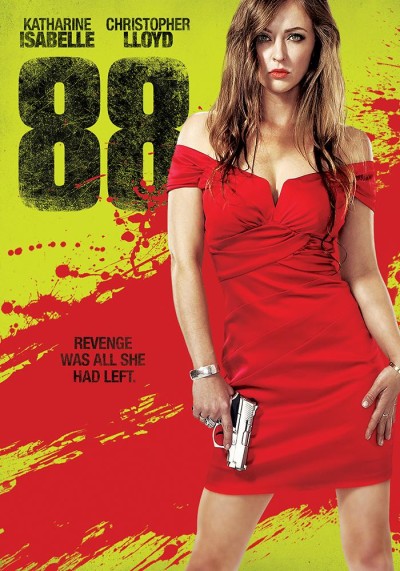★★★
“Not entirely forgettable.”
 More by accident than design, this is the third film I’ve seen in the past couple of weeks which features amnesia as a plot-device. It’s a bit of a scripting minefield, since it’s easy to become a crutch for the writer, with the amnesia being “cured” at the moments necessary to the plot. You need a lot of discipline to avoid this: Memento is likely the platinum standard for this being done well, and to be honest, most other efforts come up short in comparison. This is no different, with an absolutely key piece of data being withheld from the audience [and the lead character] until dramatically convenient at the end – though it doesn’t exactly take Nostradamus to figure it out in advance. Gwen (Isabelle) find herself eating in a diner, with absolutely no memory of how she got there. Checking her purse, she finds a gun, and accidentally shoots a waitress. Fleeing the scene, she also discovers a key to a motel room, #88. Going there, she finds more questions than answers. What was her relationship to local mobster, Cyrus (Lloyd)? Did her really kill her boyfriend, Aster? Who is Ty (Doiron), the cheerful killer who is helping her? And why does everyone keep acting as if she’s a stone-cold killer?
More by accident than design, this is the third film I’ve seen in the past couple of weeks which features amnesia as a plot-device. It’s a bit of a scripting minefield, since it’s easy to become a crutch for the writer, with the amnesia being “cured” at the moments necessary to the plot. You need a lot of discipline to avoid this: Memento is likely the platinum standard for this being done well, and to be honest, most other efforts come up short in comparison. This is no different, with an absolutely key piece of data being withheld from the audience [and the lead character] until dramatically convenient at the end – though it doesn’t exactly take Nostradamus to figure it out in advance. Gwen (Isabelle) find herself eating in a diner, with absolutely no memory of how she got there. Checking her purse, she finds a gun, and accidentally shoots a waitress. Fleeing the scene, she also discovers a key to a motel room, #88. Going there, she finds more questions than answers. What was her relationship to local mobster, Cyrus (Lloyd)? Did her really kill her boyfriend, Aster? Who is Ty (Doiron), the cheerful killer who is helping her? And why does everyone keep acting as if she’s a stone-cold killer?
This opens with a caption explaining the concept of the “fugue state”, which Wikipedia tells me is “characterized by reversible amnesia for personal identity, including the memories, personality, and other identifying characteristics of individuality… and is sometimes accompanied by the establishment of a new identity.” I note that the section there on this disorder in popular culture, is rather longer than the list of real-life incidents, since it’s pretty much an open invitation to scriptwriters, to sculpt as they see fit. The key question is how interesting the story would be without the conceit. Here, I give it a qualified passing grade, since both Gwen and Cyrus are interesting characters, the former particularly when she’s in bad-girl mode, and just not giving damn [the same can be said about Isabelle’s most well-known performance, as a teenage werewolf in the wonderful Ginger Snaps] It’s also fun to see Lloyd, better known for his mad scientist in Back to the Future, playing a sleazy scumball, But I can’t help thinking the fractured timeline doesn’t actually add all that much to proceedings, and is only made necessary by that single point of data mentioned above. It could have been played as a straightforward revenge flick, without the psychological trappings, and been little or no less effective.
The style here is a mix of the effective and the irritating. The soundtrack seems particularly intrusive, as if the director simply set her iTunes collection on random and let it play, and the shootout at the bowling alley ends with the characters skipping merrily away across the lanes, which as someone who has tried to walk down one knows, is wildly unrealistic [a over-energetic bowl had led to my wedding ring following the ball, and I can state confidently, it’s the only location where the physics of a Tom and Jerry cartoon is actually a good approximation to real life!] But even if you work out where this is going, the underlying story is a solid one, and Isabelle’s performance does a good enough job of compelling attention, to make for a passable 90 minutes of entertainment.
Dir: April Mullen
Star: Katharine Isabelle, Christopher Lloyd, Tim Doiron, Michael Ironside




